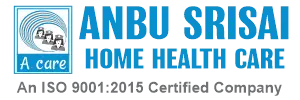Emergency Nursing Care at Home in Coimbatore
At Anbu Sri Sai Home Health Care, we understand that emergencies can happen when you least expect them. That's why we offer specialized Emergency Nurse services in Coimbatore. Our dedicated emergency nurses are available to provide immediate, expert medical care in the comfort and safety of your home during critical situations.
Our Emergency Nurse service is available throughout Coimbatore,
Chennai,
Tirupur,
Erode,
Salem,
Trichy,
Hosur,
Madurai,
Tirunelveli,
Vellore,
Pondicherry,
Pollachi,
Ooty,
Theni,
Dindigul,
Thanjavur,
Karur,
Namakkal,
Kerala: Palakkad,
Ernakkulam,
Karnataka: Bangaluru..
"Urgent medical care when you need it most. Our dedicated Emergency Nurse service provides immediate, expert medical assistance during critical situations, right in the comfort of your home."
- Rapid Response: When a medical emergency strikes, time is of the essence. Our emergency nurses are trained to respond quickly, ensuring that you receive the vital care you need without delay.
- Expertise: Our team of emergency nurses is highly skilled and experienced in handling a wide range of critical medical situations, from cardiac emergencies to severe injuries.
- Comfort and Familiarity: Being treated at home during an emergency can provide a sense of comfort and familiarity, which can be especially reassuring during stressful times.
- 24/7 Availability: Emergencies can occur at any hour. That's why our emergency nursing services are available 24/7, ensuring that you have access to immediate care when you need it most.
- Critical Care: Our emergency nurses are equipped to handle critical medical situations, providing life-saving interventions and monitoring vital signs.
- Intravenous (IV) Therapy: When intravenous medications or fluids are required, our nurses ensure proper administration and monitoring.
- Wound Care: Expert wound care is provided to manage injuries and prevent infections.
- Medication Management: We manage medications, ensuring that you receive the right medications at the right time.
- Cardiac Care: Our emergency nurses are trained in cardiac care and can assist with cardiac emergencies, including CPR.
Choose Anbu Sri Sai Home Health Care for expert emergency nursing care delivered to your doorstep.
Contact us today at 78715 31777, 91597 66477 to discuss your Home Nurse and emergency nurse needs and schedule a consultation.


